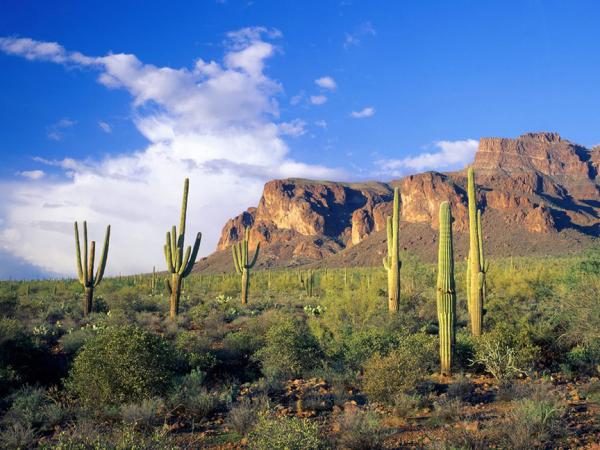Arizona Tribes and Environmental Groups Oppose HR 287 for Mining in the Tonto National Forest

Environmentalists and tribal activists are crying foul on a mining proposal on sacred land in Arizona that’s been resurrected for the eighth year in Congress.
Arizona representatives Republican Paul Gosar and Democrat Ann Kirkpatrick have re-introduced HR 287, the "Southeast Arizona Land Exchange and Conservation Act of 2013," which failed in the Senate as HR 1904 last session and was first introduced in 2005. The legislation would direct the Agriculture Secretary to transfer more than 2,400 acres of the Oak Flat Campground and surrounding public land in the Tonto National Forest into private ownership by Resolution Copper Mining (RCM), owned by the UK’s Rio Tinto PLC and the Australian company BHP Billiton Ltd.
In exchange, 5,500 acres of non-federal land would be added to the forest, including 3,000 acres along the San Pedro River and 2,500 acres of retired ranch lands. Tanayia White, assistant to Terry Rambler, chairman of the San Carlos Apache Tribe, said the proposed exchanged lands are no substitute for the Oak Flat area, held sacred by her tribe. And the biodiversity at Oak Flat is unmatched, she said – even when it’s held against the riparian acreage, so precious in the West, that would be traded for it.
Rep. Gosar, in a statement about the bill released on February 14, chalked up its lack of progress in the past to “trivial political bickering in Washington” and “needless delays.” He added that the bill “is a win-win for Arizona and for our nation – it will create over 3,700 high-paying jobs, increase U.S. energy and mineral independence, and preserve some of rural Arizona’s most beautiful natural lands.”
Kirkpatrick released her own statement in support of the bill.
"My vision for Arizona is a diversified and stable economy,” she said. “The Superior mine fits into that vision and is critical to the communities and constituents in my district - it will provide jobs, economic development and a stronger foundation for their future.”
Kirkpatrick acknowledged that the project has faced opposition from tribal and environmental groups, “and I believe their voices should be heard during this process,” she said. “I am committed to using the legislative process to advance this project and represent outstanding concerns… Let's get this done, for the good of these communities and for Arizona."
But one community in particular foresees no good in the bill: the San Carlos Apache Tribe.
“That area has historical significance,” White said. “A lot of people came from that area. There are songs, and stories, and oral histories that are all linked to that area. The mining will mean the extinction of that sacred site for the San Carlos Apache Tribe.”
Rambler added that the proposed mine would bring about “an environmental disaster on an unprecedented scale” and that as Apaches, “we will continue to fight to preserve this land for all Arizonans."
The San Carlos Apache have been joined in their opposition to the bill by the member tribes of the inter-tribal councils of both Arizona and Nevada, the National Congress of American Indians, the Great Plains Tribal Chairman’s Association, Affiliated Tribes of Northwest Indians, All Indian Pueblo Council of New Mexico, and United South and Eastern Tribes. The Navajo Nation, Fort McDowell Yavapai Apache, White Mountain Apache, Jicarilla Apache and Mescalero Apache tribes also oppose the legislation, according to the activists’ press release – as well as environmental groups including the Access Fund, Arizona Mining Reform Coalition, Tucson Audubon Society, Friends of Ironwood Forest and Earthworks, and citizen groups including the Concerned Citizens and Retired Miners Coalition and the Arizona Mining Reform Coalition.
“RCM has indicated it will use the block-cave mining technique to extract the copper from Arizona public lands, a process that will destroy huge swaths of land in the Tonto National Forest and consume more than 40,000 acre feet of water yearly,” wrote the coalition, in a recent press release. “In addition to the massive water withdrawal, the process will release toxins through the mining process that can contaminate and further deplete Arizona's precious and limited water supply.”
Don Steuter, conservation chair for the Sierra Club's Grand Canyon Chapter, pointed out that the bill “allows Rio Tinto to privatize public, sacred lands, including Oak Flat, which are of incalculable value to Native Americans, birders, rock climbers, and endangered species. And it does this by sidestepping a cornerstone of our environmental laws – the National Environmental Policy Act.”
NEPA spells out requirements for environmental review of actions taken on federal lands. So if the Oak Flat tract were put into private ownership, that law wouldn’t apply – although the Clean Air Act, Clean Water Act and Endangered Species Act still would.
Paige Rockett, a spokeswoman for the Tonto National Forest, said her agency has no connection to the bill, and is obligated to follow Congress’s lead on the fate of the exchange.
“We neither oppose nor support the bill,” she said. “Any time a piece of federal land is going to be turned over to someone else, it has to be an act of Congress. We are prohibited by law from lobbying Congress.”
But the coalition doesn’t face any such restrictions, and White says they’re prepared to rally against the bill – just like they did last year and all the times before. Roy Chavez, of Concerned Citizens and Retired Miners Coalition, said Arizona's senators and representatives should be cautious about fighting too hard.
“If passed, this bill may leave Arizona with nothing but a massive hole in the ground and a huge cleanup bill costing the American taxpayers billions of dollars. That would be a most unfortunate legacy for Representatives Gosar and Kirkpatrick," he said.
Read more at http://indiancountrytodaymedianetwork.com/2013/02/26/arizona-tribes-and-environmental-groups-oppose-hr-287-mining-tonto-national-forest-147894